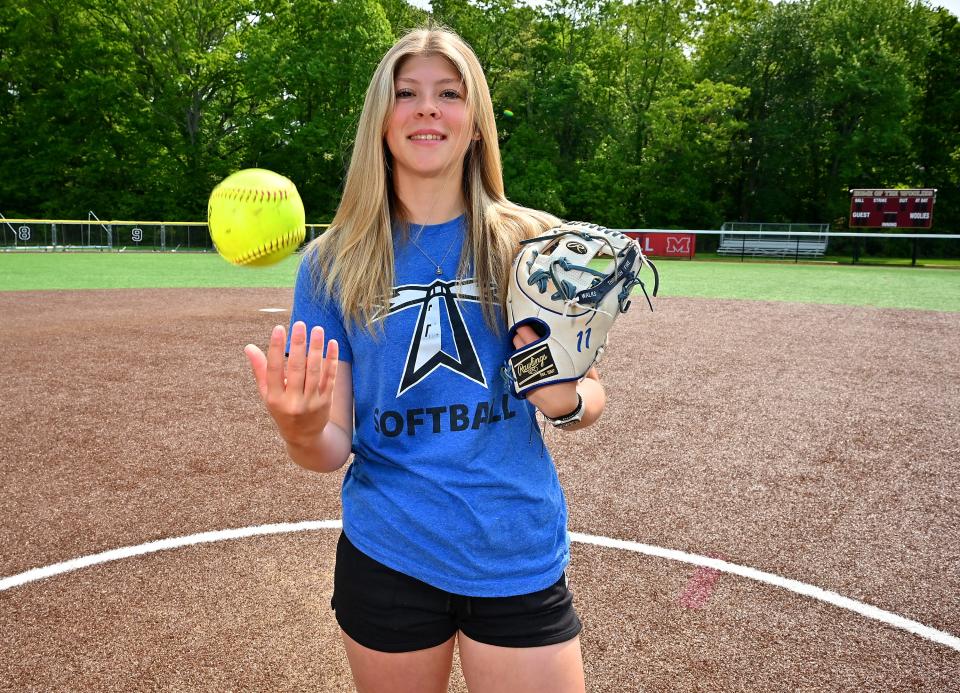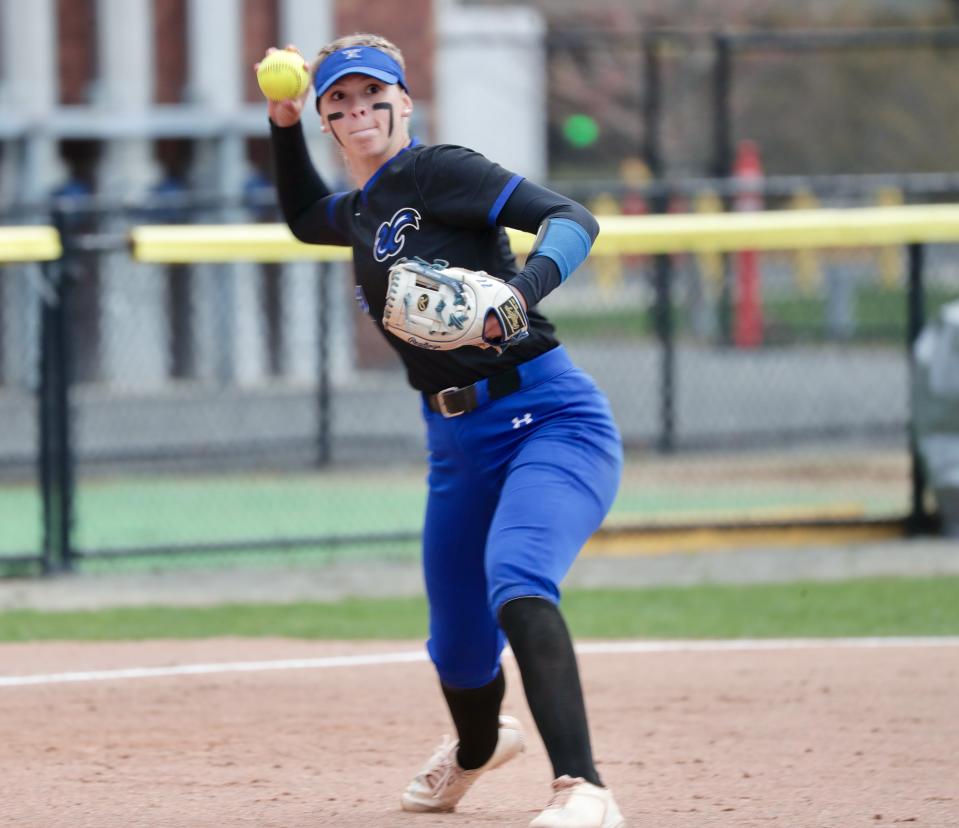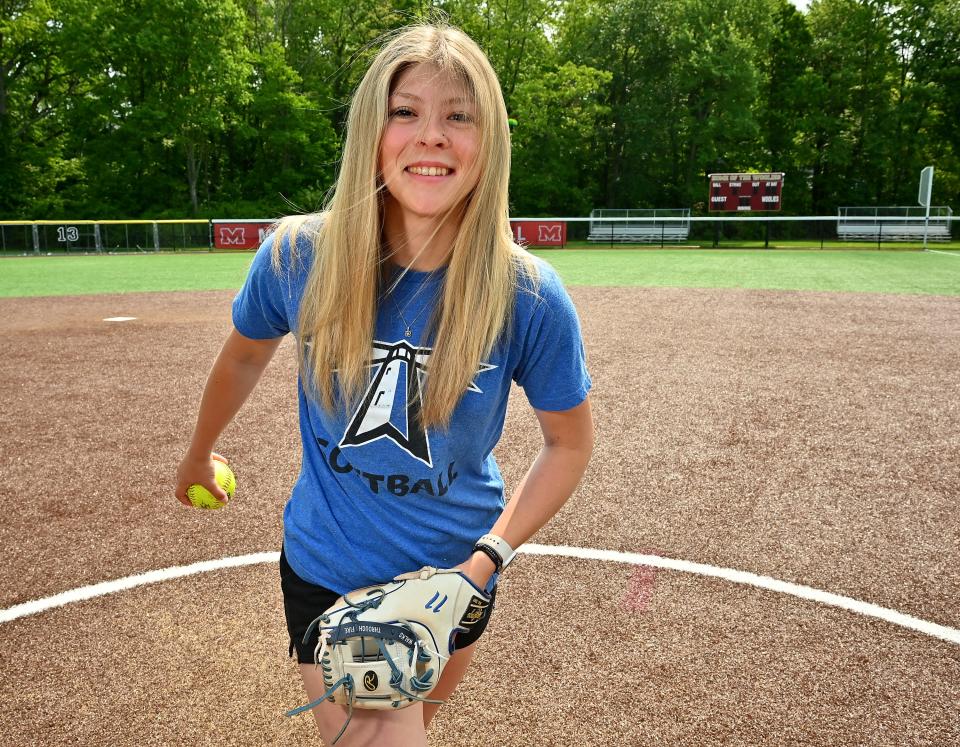Millbury's Lauren Miner overcomes thoracic outlet syndrome to earn all-star honors at UMass-Boston

MILLBURY — Lauren Miner’s stature – she’s 5-foot-11 – strength, versatility, enthusiasm and energy were among the many attributes that UMass-Boston softball coach Natalia Ardagna noticed when she was recruiting the former Millbury High slugger.
“She definitely stood out,” Ardagna said. “For me, I was surprised she wasn’t committed already. I was super excited to be able to get in and get her to come to UMass-Boston.”
This season, Miner’s first at UMass-Boston, she earned a starting spot at shortstop before switching to third base. She blasted a two-run homer in her first collegiate at-bat, went on to play every inning of every game, earned Little East Conference all-rookie team honors, and achieved a 4.0 grade point average.
All the while, Miner battled excruciating pain caused by thoracic outlet syndrome, which occurs when blood vessels or nerves in the space between the collarbone and the first rib are compressed.
“Under my scapula,” Miner said, “I have nerves that are pinching, and it sends waves of pain down my (right) arm and makes my elbow go numb and my hand go numb. It’s numbing, but it’s a fiery pain at the same time.”

Miner said she experienced some discomfort in her arm and shoulder during her sensational senior season for the Woolies, but it hardly held her back. She belted 12 home runs, struck out 194 in 105 innings and earned T&G Super Team honors. The mild pain was still there during summer travel ball and the Beacons’ fall season, “but I was still able to throw and function,” Miner said.
In January, just before the start of UMass-Boston’s preseason, Miner was home to help at an umpire training event, and after pitching at it, the symptoms “came on with a vengeance,” her mom, Liz Miner, said. Her hand swelled, and she had pain and tingling in her arm.
The arm pain continued during the Beacons’ morning preseason practices.
“It pretty much got unbearable to play my sport,” Lauren Miner said, “which was tough.”
Finding out what is the problem
Diagnosing the issue took some time.
“I was scared it was torn labrum or rotator cuff or ligaments that had detached because of the pain I was in,” Miner said, “but I had no idea.”
At school, Miner began a regimen with the Beacons’ athletic training staff that included stretching, soft tissue work, modalities, cupping and kinesio taping. She saw Dr. Michael Beasley, a sports medicine physician at Boston Children’s Hospital and UMass-Boston’s head team physician, underwent diagnostic testing and an MRI, and received her diagnosis of thoracic outlet syndrome in February.
Still, the pain persisted.
“There is no quick fix for this,” Liz Miner said. “It’s not ‘Take a pill and it goes away,’ although she would love that.”

On the field, throwing caused pain. Off of it, it was writing, sitting up straight in a chair, and sleeping.
“I would wake up and my right arm would feel eight times heavier than the left,” Miner said. “It got to the point where I was feeling more symptoms throughout the day outside of softball than during softball. ‘Yeah, we have a diagnosis, but why can’t we fix it because it was pain all the time.’”
Physical therapy, medication for the nerve pain, a change in her training patterns, a slight adjustment to her throwing motion, rest, support from her coaches, teammates and family, and her own determination pushed Miner through.
“She did come to me (in the preseason) and told me (her arm) was bothering her,” Ardagna said. “Knowing what typical freshmen are like, they’ll either take themselves completely out or push themselves until they can’t go anymore. I tried to be mindful of the amount of throws she had, the amount of drills she did, so that we could give her some time to rest and heal up a little bit.
“Freshmen are going through so many transitions in life,” Ardagna said, “and then you add an injury on top of it. Being surrounded by a new group of people that you don’t have fully formed relationships with is extremely challenging. For her to be able to be like, ‘Yeah, I’m going to play through it and be out there as much as I can,’ was impressive. As the season went on, she got better at managing her own pain and listening to the things her body was telling her.”
Overcoming challenges in first college season
Miner led her team in OPS (1.007) and triples (5), tied for the lead in home runs (4), was second in RBIs (27) and third in batting average (.330).
The start of the season was especially challenging, both physically and mentally, for Miner, who began the year at shortstop.
“It was challenging because I knew I could make the plays,” she said, “but when it would result in a bad throw because of my arm, it was really frustrating. With the help of my coaches and teammates, they really helped me through that.”
With continued stretching exercises and medication, the pain dissipated as the season went on.
“I enjoyed every single second of those games I played,” Miner said “and I’m thankful to have played every inning of those games no matter what.”
Miner believes her thoracic outlet syndrome, which can be caused by overuse or repetitive sports-related activities, stemmed from poor pitching habits/mechanics.
“And sort of grew from there,” Liz Miner said.
Miner did get back in the circle this spring. In two relief innings against Nichols, she allowed one hit and struck out three.
“We have the utmost respect for her coaching staff, who supported her through this crazy time,” Liz Miner said, “and let her grow and work and thrive on the team despite (her injury).”
Miner, a criminal justice major, finished her final exams May 19. Her accomplishments on and off the field this year, her maturity, and her fortitude have made her parents, Liz and Ed, extremely proud.
“My husband and I are in awe of her because of her internal and external strength,” a tearful Liz said. “She has worked so hard to get where she is. We love to watch her play, her as part of her team. She is truly not in it for herself; she’s in it for the love of the sport and the love of her team.”
Miner, who is feeling good physically except for a few minor aches, will be working as a camp counselor this summer and saving up money for an off-campus apartment in the fall. She’s looking forward to hanging out with her friends, and she will continue to work with the UMass-Boston athletic training staff, as well as her mom, who is an occupational therapist, on stretching, strengthening and stabilizing her shoulder and the muscles around it throughout the summer.
“Hopefully, it doesn’t act up again,” Miner said. “You can’t get rid of (thoracic outlet syndrome), but hopefully with the medication and the stretching, strengthening and stabilizing, it’s just going to be better in the fall.”
—Contact Jennifer Toland at jennifer.toland@telegram.com. Follow her on Twitter @JenTolandTG.
This article originally appeared on Telegram & Gazette: Millbury's Miner battles through adversity to earn all-star honors at UMass-Boston

